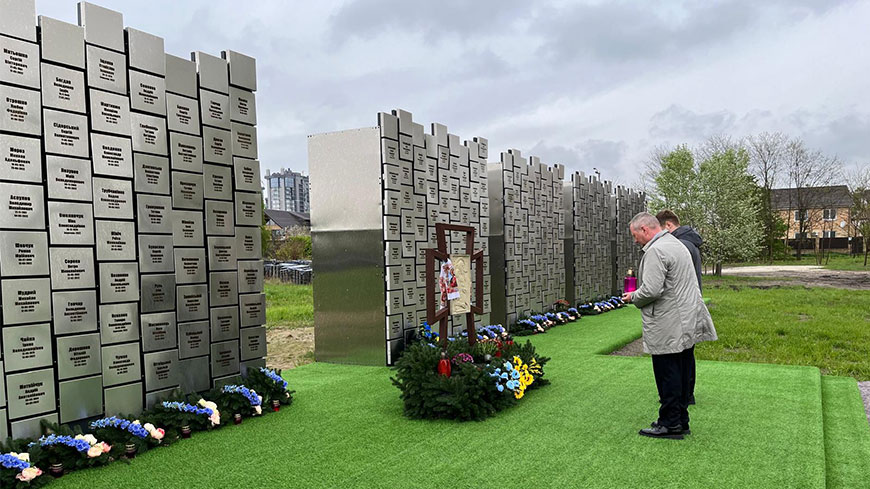The new Council of Europe Commissioner for Human Rights, Michael O’Flaherty, carried out a visit to Kyiv, Ukraine from 23-25 April. This was his first visit to a member state since taking up his post on 1 April. With the current human rights landscape in Europe being dominated by Russia’s war against Ukraine, the visit was an opportunity for the Commissioner to gain a deeper understanding of the human rights situation. Through dialogue with the authorities and other partners, he identified areas where he can help to advance the protection of human rights in the country.
Commissioner O’Flaherty paid particular attention to the human rights situation of Ukrainian children, including those transferred to Russia and Belarus, those residing in areas of Ukraine temporarily occupied by Russia, as well as those living in government-controlled territory. While stressing the importance of continuing efforts to ensure the return of the children transferred to Russia and Belarus, the Commissioner also underlined the need not to forget the children in the temporarily occupied territories. The Commissioner particularly welcomed the authorities’ high-level commitment to avoid the future institutionalisation of children. He also welcomed the attention given by the Ukrainian authorities to the development of a more child-friendly juvenile justice system and to increasing protection of victims and witnesses’ rights in the context of criminal process more generally.
The scale of continuing serious violations of human rights of the people living in territories of Ukraine under Russian occupation is of great concern to the Commissioner. He stressed that “we must never lose sight of the human rights of the people of Crimea, including the Crimean Tatars”, and expressed his appreciation for the work carried out by the Ukrainian authorities in developing a human rights-centred approach to the eventual de-occupation of the peninsula. He deplored the reported violations of the freedoms of thought, conscience and religion in the temporarily occupied territories. The Commissioner’s attention was also drawn to reports of serious human rights abuses, including torture, committed against Ukrainian prisoners of war and civilians detained in the Russian Federation.
Recognising the immense challenges, scarce resources and difficult choices facing the Ukrainian authorities, Commissioner O’Flaherty noted the urgent need for increased investment in rebuilding Ukraine’s infrastructure destroyed by Russian attacks. “There are some things that cannot wait until the war is over. For instance, ensuring that every Ukrainian child can go to school, in dignity and safety, is one such immediate concern. The international community should urgently step up its efforts to help Ukraine make the full enjoyment of the right to education by every child in Ukraine a reality,” the Commissioner added.
The existence of a vibrant civil society in Ukraine, representing a diversity of ideas and unique skills, was a source of inspiration for Commissioner O’Flaherty. “The expertise of Ukraine’s civil society is one of its most valuable resources. Civil society actors should be consulted in all public decision-making processes relevant to human rights throughout Ukraine, including on laws and public policies that affect the human rights of people in the temporarily occupied territories of Ukraine”.
The Commissioner also welcomed the establishment of the Council of Europe’s Register of Damage for Ukraine. “The Register, which serves as a record of claims for compensation for the damage, loss, and injury caused by Russia’s aggression, is an essential element of any reparations and restorative justice efforts. Whatever design is agreed upon in the work towards the establishment of a future compensation mechanism, it is clear to me that one of the goals of this endeavour must be to provide redress to the very people victimised by the Russian aggression.”
“The existential threat facing Ukraine today is at the same time the supreme challenge for the entire values-based human rights system on our continent,” the Commissioner concluded. “As Ukraine rises to this challenge, I intend to play my part by offering my voice as well as the advice and expertise of my Office for the benefit of the victims of Russia’s aggression”.
During his visit, the Commissioner met with the Deputy Prime Minister – Minister for Reintegration of the Temporarily Occupied Territories of Ukraine, Iryna Vereshchuk; the Minister of Justice, Denis Malyuska; the Representative of the President of Ukraine in the Autonomous Republic of Crimea, Tamila Tasheva; the Advisor – Presidential Commissioner for Children’s Rights, Daria Herasymchuk; and the Prosecutor-General, Andriy Kostin. Before the visit, in Strasbourg, the Commissioner met with the Speaker of the Parliament, Ruslan Stefanchuk. In Kyiv, he met online with the Parliamentary Commissioner for Human Rights, Dmytro Lubinets, and representatives of his office at the Child Rights Protection Centre. He had meetings with representatives of civil society and international organisations. In Bucha, he paid respect to the victims of Russia’s aggression, and in Gostomel he visited a school destroyed as a result of Russia’s attack in 2022.


